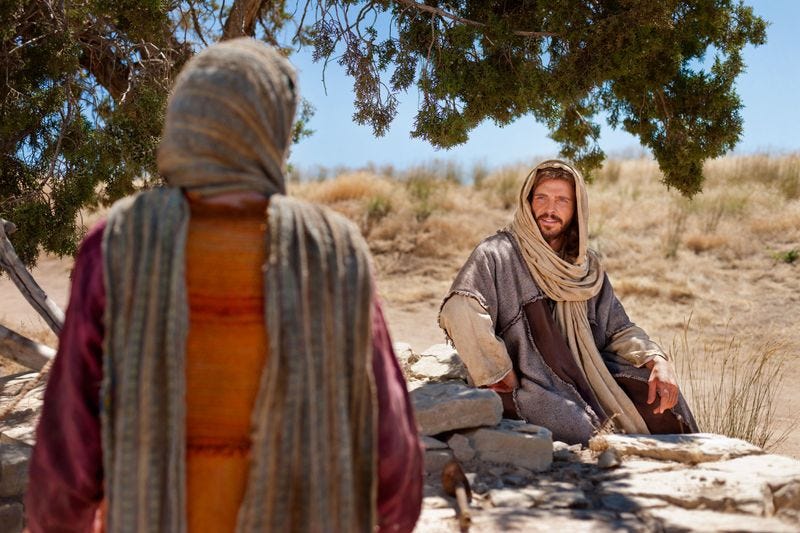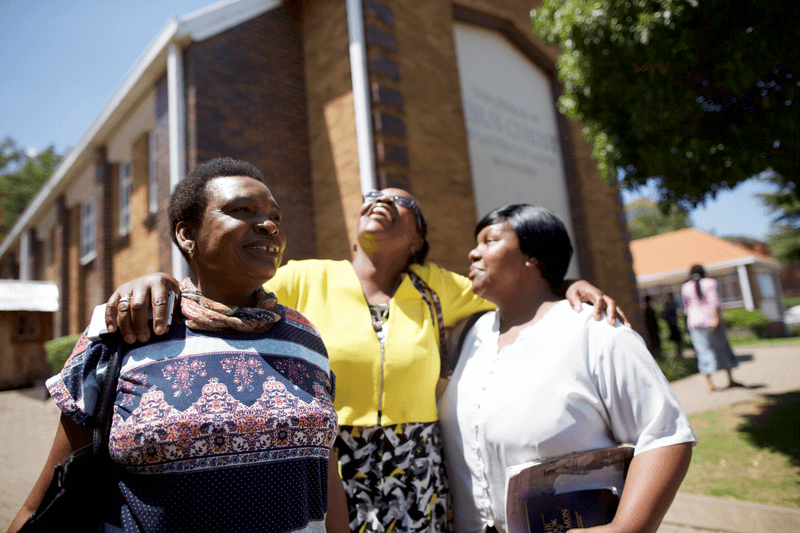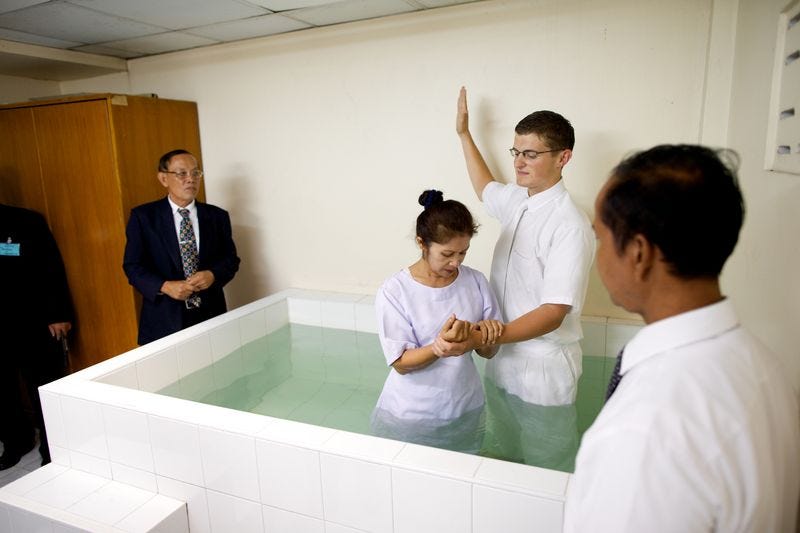What is the Need for a Church?
There is a lot of good in the world. But some blessings can only be achieved through making sacred promises with God through his authorized servants.
There is a lot of good in the world. It warms my heart to hear stories of first responders serving during times of emergency, teachers giving time and energy to help their students, and volunteers who donate to blood banks, food banks, and disaster relief.
We are more conscious of diversity than we ever have been. We want our children to grow up in a better world than we grew up in.
These good things are commendable, but insufficient in a world so full of need—not just physical need, but spiritual need. There is more need than there is capacity to give. Our governments can’t legislate goodness. Our systems don’t always incentivize it.
When it comes to spirituality, we try to find sufficient replenishment in visiting nature, in meditation, in turning inward to try to understand ourselves. Perhaps we understand there is a source of goodness in the universe and we believe that solitude and soul-searching can help us find it.
These spiritual things are commendable, meaningful, and healing—but also insufficient. We can’t find the truths we seek or find healing on a spiritual level without God.
Specifically, our hope for these things is found only through Jesus Christ.
This post will be geared toward people who are new to Christianity, especially to The Church of Jesus Christ of Latter-day Saints.
Jesus Established a Church
This is the third article in a three-part series about the foundational beliefs of Christianity. The first two posts answer the questions: Who is Jesus Christ? and What is the Purpose of Life?
Throughout the ages, God has taught mankind about Jesus Christ, his gospel, and his plan for our eternal happiness through prophets and an organized church. He does so today.
To understand why goodness and spirituality alone are not enough to achieve eternal, lasting healing and happiness—to understand the need for a church—it may be helpful to look at an analogy.

The Gospel of Jesus Christ is Administered Through His Church
“For centuries, black powder was the most powerful explosive available. It could launch cannon balls, but it wasn’t effective for most mining and road construction projects. It was just too weak to shatter rock.
“In 1846 an Italian chemist named Ascanio Sobrero synthesized a new explosive, nitroglycerin. This oily fluid was at least a thousand times more powerful than black powder. It could easily shatter rock. Unfortunately, nitroglycerin was unstable. If you dropped it from a small height, it’d blow up. If it got too hot, it’d blow up. If it got too cold, it’d blow up. Even placed in a cool, dark room and left alone, it’d eventually blow up. Most countries banned its transportation, and many banned its manufacture.
“In 1860 a Swedish scientist named Alfred Nobel began trying to stabilize nitroglycerin. After seven years of experimentation, he achieved his goal by absorbing nitroglycerin into a nearly worthless substance known as diatomaceous earth, or kieselguhr. Kieselguhr is a porous rock that can be crumbled into a fine powder. When mixed with nitroglycerin, kieselguhr absorbs the nitroglycerin, and the resultant paste can be shaped into “sticks.” In this form, nitroglycerin was much more stable. It could be safely stored, transported, and used with undiminished explosive power. Nobel named the combination of nitroglycerin and kieselguhr ‘dynamite.’
“Dynamite changed the world. It also made Nobel wealthy. Without a stabilizer, nitroglycerin was just too hazardous to be commercially valuable, as Ascanio Sobrero found out. By itself, as I mentioned, kieselguhr was of little value. But the combination of the two components made dynamite transformative and precious.
“In a similar way, the combination of the gospel of Jesus Christ and The Church of Jesus Christ of Latter-day Saints provides powerful and transformative benefits for us. The gospel is perfect, but a divinely commissioned church is required to preach it, maintain its purity, and administer its sacred ordinances with the Savior’s power and authority.”
This is My Gospel—This is My Church, Elder Dale G Renlund, emphasis added
Let’s look at the two elements that make up this powerful and transformative combination:
The Church of Jesus Christ of Latter-day Saints
Religion without the power and authority of God is like the diatomaceous earth or kieselguhr in the above example.
If only a manmade institution, a church would have as much power for good as any other manmade institution. Both great good and also great wrong have been done in the name of religion. It is important to note that any wrongful acts done by people of faith are not done in the name of God.
However, the value that a church provides in administering the gospel of Jesus Christ is organization, order, and consistency.
Here are a few key points when it comes to recognizing Christ’s true church as opposed to a manmade institution:
God accomplishes his works through ordinary human beings whom he has chosen and to whom he gives power (called priesthood power).
Men who claim power or authority not given to them by God only have as much power as men and their institutions give them, which is still sometimes a lot of power.
Nevertheless God’s plan—the aim and scope of which is eternal joy, and not just mortal gratification—cannot be frustrated.
Christ’s true church will follow the pattern established by him during his earthly ministry, including the following:
It is led by prophets, apostles, and other authorized leaders and teachers (Luke 11:49; Ephesians 2:20; Ephesians 4:11-13)
It is administered by priesthood power and authority (Matthew 16:19; Mark 3:14-15; 1 Peter 2:9)
Its central message is Jesus Christ and his Atonement (Acts 4:10-12; Romans 3:23-25)
It contains the priesthood ordinances and covenants necessary for salvation (Matthew 3:13-17; John 3:5; Luke 22:19-20; 1 Corinthians 11:23-26; Acts 8:14-17)I
It teaches for doctrine the gospel of Jesus Christ (see next section)
The Church of Jesus Christ of Latter-day Saints, even just from an organizational standpoint accomplishes great good:
It partners with other organizations like the Red Cross, UNICEF, NAACP, World Food Program, Catholic Relief Services, and others to bring relief to people in need around the world.
It has one of the world's largest women's organizations, the Relief Society, in which women lead out in strengthening the family, bringing themselves and others closer to Jesus Christ, providing service and relief to the needy, and teaching and learning about the unique role of women in God's plan.
There are also organizations for men, youth, and children which meet their needs, provide service opportunities, and teach about Jesus Christ.
Although it is a global organization, each unit (called a ward or branch) is presided over by local leaders consisting of men, women, and youth who minister individually to members and their needs.
The same teachings and organization are found consistently from ward to ward, so that Sunday worship services and doctrines taught are exactly the same in whatever part of the world you may visit.
On an individual level, members of the church are encouraged to be good citizens of the countries in which they reside, to give charitably on a regular basis, and to follow the example of Jesus Christ in serving, loving, and fellowshipping people of all walks of life.
But these things on their own would be insufficient without the gospel which motivates and empowers such a church and its members.

The Gospel of Jesus Christ
This is the “nitroglycerin” in the above analogy—the transformative and powerful thing that changes us from who we are to who we have the potential to become. It helps us become more and more like Jesus Christ.
Jesus paid the price for our sins and transgressions. In return, he asks us to live his gospel, which consists of:
Having faith in Jesus Christ and his Atonement
Repenting of our sins and mistakes
Being baptized by immersion as a sign of our commitment
Receiving the gift of the Holy Ghost
Enduring faithfully until the end of life, continually keeping God’s commandments & renewing our covenants
However, with only a human understanding of these principles uncertainty creeps in:
What does it mean to “have faith” or to “repent”?
How is baptism to be administered and what does it signify?
What exactly is required in order to receive the gift of the Holy Ghost?
Are these “one and done” tasks or is more required?
Let’s look at each of these parts of the gospel of Jesus Christ. The scriptures and modern prophets give us additional clarification to help us understand.
Faith
As the writer of Hebrews said: “Now faith is the substance of things hoped for, the evidence of things not seen.” Faith is neither a perfect knowledge nor a blind hope, rather it is a feeling of trust in God—trust enough to act on the direction we receive from him through prophets and through answers to prayer.
Even if we don’t know for sure that God’s commandments lead toward happiness, we can “experiment upon [his] words” and learn by trial what effect they have in our lives. Even if we start with just a “desire to believe” it can grow into a sureness akin to knowledge (Alma 32:26-34).
To be redeemed by the Atonement of Jesus Christ, it is necessary to have faith in him—that he lived, that he loves us, that he paid the price for our sins, and that becoming more like him will lead us to greater happiness. We recognize that we need his grace and mercy in our lives every day and we want to follow his example.
When we trust that following the example of Jesus Christ leads to happiness, our lives will naturally reflect a continual effort to change and improve. Our joy will increase and we will feel peace even in the midst of our trials.
Faith in Jesus Christ leads us to take additional action, following the other gospel steps below. The gospel of Jesus Christ can be seen as a path of progression. Each step flows into the next, taking us toward our desired destination.
Repentance
Repentance means turning away from our sins and mistakes and turning toward God. When we repent, our desires, thoughts, and actions change to be more in harmony with God’s will. This is sometimes called having a “change of heart.”
Repentance is more than just exercising willpower to overcome a bad habit. It is more than just feeling sorry. It is something we do in partnership with Jesus Christ, which changes our nature. If we have repented we will naturally desire to do right and avoid wrong. We will feel more room in our lives for love and light because—with the Savior’s help—we will have moved the darkness out of our hearts.
The process of repentance often includes these key steps:
Recognizing that we have made a mistake and are not in harmony with God.
Feel genuine remorse and desire to change.
Confess our mistake to God in prayer.
For serious sins, speaking to an authorized church leader may also be required. Church leaders have a close connection to God and can help us see clearly how to be reconciled to him. They can provide additional support as we try to change.
Make restitution. For example, if the mistake was speaking disrespectfully to someone we should go to them and apologize.
Do our best not to repeat the mistake.
We make mistakes every day, so repentance is a daily process. Sometimes it can seem overwhelming, but God is merciful and is willing to help us if we are genuinely trying to change.
Repentance is not a punishment for sin. Rather it is the joyful process of shedding mistakes that tend to weigh us down. This is only possible through the Atonement of Jesus Christ.
Baptism
Baptism is the first ordinance of the gospel. Ordinances are sacred ceremonies that allow us to make covenants (or promises) with God and receive his promises in return. Covenants bind us more closely to God as we keep them. In this way, we receive even more of God’s help and blessings in our lives.
Ordinances must be performed by those who have priesthood power and authority from God. In other words, only God’s authorized representatives can help us enter into promises with him.
The covenant of baptism is necessary for us to be redeemed from sin. Before entering into a covenant, such as baptism, we should have a strong commitment to keep the promises we are making.
When we are baptized, we promise to:
Take upon ourselves the name of Jesus Christ (becoming his disciples)
Always remember him
Keep his commandments
God promises in return to:
Allow the Holy Ghost to be our companion (more on this in the next section)
Baptism is done by immersion as Jesus was baptized and as he instructed his prophets. The ordinance of baptism is symbolic of being washed clean, but it also represents the death, burial, and resurrection of Jesus Christ. It can also represent the death and burial of our old selves and being reborn into a new life.
Little children under the age of 8 have no need to be baptized. They are not yet of the age of accountability and are saved by the Atonement of Jesus Christ.
Gift of the Holy Ghost
Baptism is an ordinance with two parts. We must be “born of water and of the Spirit” (John 3:5) to enter the kingdom of God.
The companion ordinance to baptism is called “confirmation.” Authorized priesthood holders place their hands on the newly-baptized individual’s head, confirm them a member of the Church of Jesus-Christ of Latter-day Saints, and confer the gift of the Holy Ghost.
Heavenly Father, Jesus Christ, and the Holy Ghost comprise what is called the Godhead. They are three separate beings, but one in purpose.
Heavenly Father and Jesus Christ are not with us physically upon the earth. But the Holy Ghost, who is a personage of spirit, can be our constant companion as we keep our baptismal covenant.
The Holy Ghost has many roles, including:
Cleansing and sanctifying (helping us become holier, more like God)
Helping us recognize truth and teaching us truth
Warning us of danger
Giving us comfort and peace during challenging times
Giving direction, often in answer to our prayers or others’
Strengthening us to resist temptation and keep our covenants
Helping us feel God’s love
It is our responsibility to keep our covenants and qualify for his companionship.
This talk by a modern apostle, Elder Gary E Stevenson, describes more about the gift of the Holy Ghost and how to understand when he is speaking to you.
Endure to the End
Being baptized and receiving the gift of the Holy Ghost are the start of the path of discipleship. After baptism, you will continue to make and renew covenants with God and try to keep his commandments. Remember, you are promised help from God as you continually try to change and become more like Jesus Christ.
Enduring in faith until the end of your life will include continuing many of the steps above:
Continue to exercise faith in Jesus Christ and his Atonement.
Repent daily
Take the sacrament weekly on Sundays
Continue to seek daily to invite and listen to the Holy Ghost
Keep the commandments
Serve others as Jesus would serve
Make new covenants in the temple, as appropriate
I want to highlight a few of these:
The Sacrament
Sometimes called “communion” in other churches, the sacrament is an ordinance that takes place during regular Sunday worship services.
Jesus instituted the sacrament in what is known as the Last Supper, in which he broke bread and drank wine with his disciples before he was taken prisoner by Roman soldiers.
Like baptism, this ordinance also has symbolism. A special prayer is given by the priesthood holders administering the sacrament, which sets apart the bread and water to be used as symbols.
The bread represents Jesus’s body and reminds us that he died and was resurrected so we could live again. The wine (or water, which we use today) represents his blood which was shed on our behalf to cleanse us from sin.
During the prayer we are reminded of our baptismal covenant. By repenting and taking the sacrament regularly, we can continually be cleansed from our sins without the need to be baptized again.
Keep the Commandments
We are instructed to read and study God’s word, given through his prophets. Prophets and apostles teach God’s commandments, which will direct us how to become more like Jesus Christ and receive the greatest happiness. Some of these include:
The Ten Commandments given to Moses
The higher law given by Jesus (Matthew 5-7)
Repentance
Obeying the law of the land
Keeping the law of chastity
Honesty
Keeping the word of wisdom (a law of health with its own special promise)
God and his prophets have a vantage point that we do not have. They can see the hazards we may face now and in the future and they sound a warning voice to keep us safe.
Just as obeying traffic rules keeps us safe and free to travel to and from our everyday destinations, keeping God’s commandments helps us remain safe and free to travel each stage of our eternal destination.
If we endure to the end of our lives in faith along this gospel path (sometimes also called the “covenant path”) we will be able to receive the blessings God has in store for those who keep their promises.
Additional Temple Covenants
Among the covenants made in the temple, one that I wish to highlight is the ordinance of marriage or “sealing.” This is a special covenant, not just between an individual and God, but between a man, a woman, and God.
When a man and woman are married in the temple of God by proper priesthood authority, they are promised that their relationship will endure into eternity and not just “till death do you part.” This sealing together of the family also includes children, ensuring that they will forever belong to their family.
The purpose of sealing together families for eternity is to ensure loving, lasting, harmonious, and pure relationships—the kind that we all wish for but can only be made possible through a covenant with God, who helps us achieve such relationships.
Many of the ordinances we receive for ourselves can also be performed on behalf of deceased loved ones and ancestors in the temple. Just like us, our deceased loved ones may accept or reject those ordinances. Thus, the work of the temple is meant not only to seal our immediate family, but our family going back throughout time.
For those who have not had the opportunity to be married in this life, but who wish for marriage, we are promised that no blessing will be denied us if we continue on the gospel path. Whether in this life or in the next, we will have the opportunity for an eternal marriage if we desire it.
The Gospel and the Church
The gospel of Jesus Christ provides the power and the church provides the priesthood authority and ordinances necessary to achieve salvation in the highest kingdom of glory. The way to know for yourself if this is true is to try learning about and living the gospel yourself.
The following links may be helpful if you want to learn more:
Schedule an appointment for missionaries to visit and teach you more. They can answer any questions you may have. Wherever you are in the world, there are missionaries near you.
Visit one of our local congregations to see what our services are like. Typically men wear suits and women wear dresses for our worship services, but you will be welcome as you are. Here is a guide for Sunday services.
Explore on your own—this link includes uplifting videos and email series’ that can help you come closer to Jesus Christ.
In Closing
Without the gospel of Jesus Christ, I would not be who I am today. It has been my light in the midst of depression, loneliness, and pain. There have been days that I have prayed for help to just make it through. Life with a disabling disease is an immense challenge, not only physically but on every level.
But true to his promises, God brings me peace through the constant companionship of the Holy Ghost. I know I can face any challenge with him by my side.
On the other hand, I can tell you from personal experience that serving and worshipping in God’s church harnesses the power of the gospel and distills it, making it more effective in my life.
I have seen the difference that taking the sacrament, visiting the temple, and worshipping and serving with other ward members can have in my life. Receiving priesthood blessings and hearing the word of God through his prophets has given me strength and answers to my prayers.
Going forward, this blog will follow a devotional style, where I share more of my personal experiences on coming to Christ. I hope you will continue to follow along.
And I hope you will want to build your own relationship with our Savior, Jesus Christ, who knows and loves you perfectly.
He knows you because he has felt every one of your pains, sorrows, and afflictions. And he wants to heal, help, and comfort you. You are precious to him. And with his help you can achieve the happiness you desire.
This is blog is not an official website of The Church of Jesus Christ of Latter-day Saints. To learn the Church’s official doctrine and teachings please visit: comeuntochrist.org.












